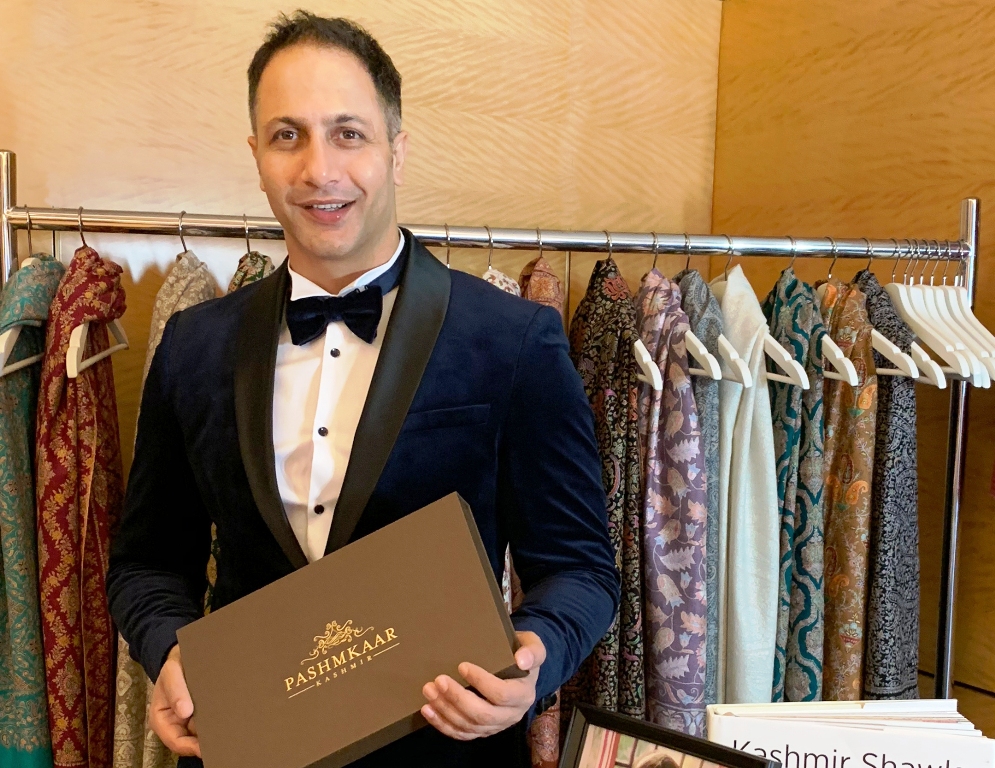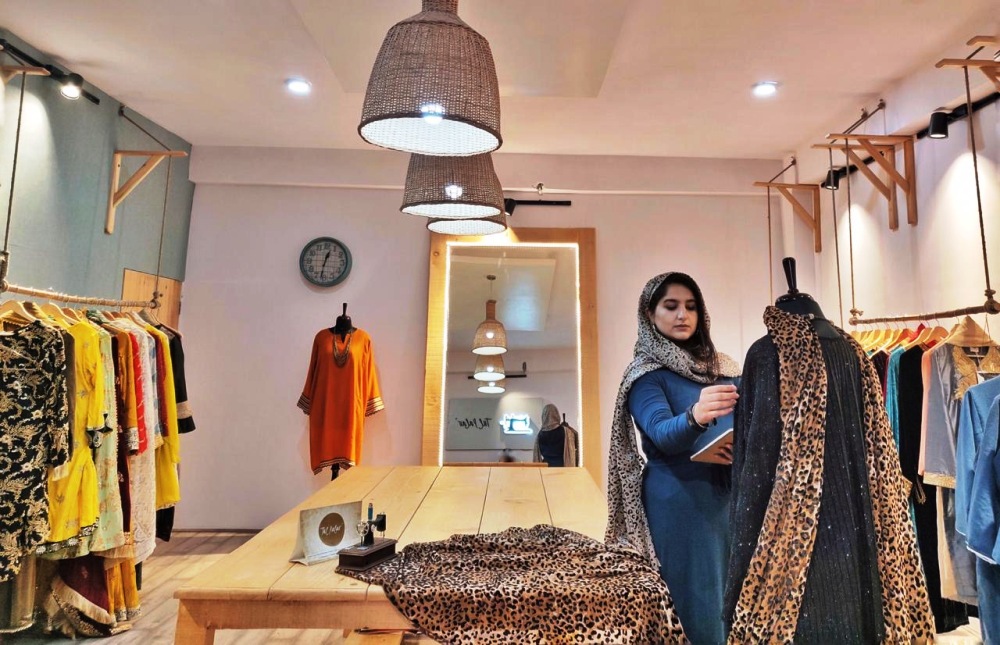In the last few years, a group of new-age entrepreneurs innovated the tradition and converted it into a fashion statement. The process fetched Kashmir a basket of labels and brands that are being respected in the fashion market, Syed Shadab Ali Gillani discovers
Helping Kashmir blend tradition and modernity is a new craze. It is as much in music as it is in appeals. A group of new-age entrepreneurs are transforming the region’s cultural heritage into contemporary fashion. Their brands are bringing Kashmiri artisanry to the global stage, from intricate Pashmina shawls to modern apparel featuring traditional embroidery.
Each brand not only highlights the beauty of Kashmiri artistry but also supports local artisans, helping to sustain the essence of Kashmir in the ever-changing world of fashion.
A Son’s Mission
Pashmkaar, a brand rooted in Kashmiri traditions, asserts its commitment to preserving and promoting the region’s authentic craftsmanship. Founded nearly a decade ago by Tariq Dar, whose father worked in the industry for 40 years, Pashmkaar is more than a business venture. The promoters insist it is a cultural mission to elevate Kashmiri artistry globally.

From its flagship store in Kashmir to international outlets in Hong Kong and Taiwan, Pashmkaar has carved a niche by focusing exclusively on pure Kashmiri craftsmanship. “We are the first brand in Kashmir dedicated solely to preserving our heritage,” Tariq said. The brand’s offerings range from the finest Pashmina wool to intricate Kashmiri embroidery techniques like Aari, Tila, and Sozni, all crafted by local artisans.
Pashmkaar’s philosophy is authenticity. Unlike others who blend Kashmiri craftsmanship with different materials or styles, Pashmkaar remains dedicated to using only the purest forms of Kashmiri techniques and materials. “Everything is authentically, soulfully Kashmir,” Tariq affirms, reflecting their commitment to maintaining the integrity of their craft.
Their dedication extends beyond retail; Pashmkaar operates with a global perspective, exporting their creations to destinations like the USA and UK. What sets them apart is their insistence that every product sold bears the Pashmkaar name. “We want Kashmir’s identity to shine through in every piece,” Tariq insists, proudly noting instances where their shawls, including those worn by dignitaries like the Prime Minister, are recognised as distinctly Kashmiri.
Empowering Artisans
Pashmkaar goes beyond commercial success by focusing on empowering local artisans—a community often overlooked despite their crucial role in sustaining Kashmir’s cultural legacy. “Our artisans are the backbone of our brand,” Tariq Dar said. With approximately 500 artisans directly or indirectly employed, Pashmkaar not only provides economic opportunities but also seeks to instil pride and dignity in their work.
Recently, Pashmkaar launched the Learn to Earn initiative, training young girls in traditional Kani weaving. This effort aims to ensure the continuity of Kashmiri heritage skills. “It’s about inspiring the next generation,” Tariq remarked, underscoring their commitment to sustaining a craft that has endured for centuries.
As the brand expands with plans for more international stores and participation in global fashion events such as New York Fashion Week and London exhibitions, Pashmkaar remains dedicated to establishing Kashmiri craftsmanship as a globally recognised brand. “We want the world to know the true essence of Pashmina,” Tariq concluded. “Our journey is not just about selling shawls; it is about preserving a cultural heritage that defines us.”
Couple’s Enterprises
Cilwana Studio has become a symbol of artisanry and cultural fusion in Srinagar. Founded in 2018 by Nusaiba Bhat and Adil Masood, the boutique brand has redefined traditional fashion by blending Kashmiri heritage with contemporary design.

The studio began with a clear vision: to bring authentic Kashmiri craftsmanship to a wider audience across India. Initially focusing on footwear and intricately embroidered Lucknawi Chikankari garments inspired by Kashmiri patterns, the brand quickly gained recognition for its quality and use of pure fabrics.
“In 2019, we opened our first retail outlet in Rajbagh, Srinagar,” recalls Nusaiba Bhat. “By 2021, our flagship store in City Mall, Srinagar, marked a milestone in our expansion. We also participate in exhibitions in major cities like Delhi, Bombay, Dubai, Malaysia, Kerala, and Singapore, marking our presence in diverse markets.”
What sets Cilwana apart is its dedication to handcrafted excellence. “Our unique selling point lies in our meticulous handwork and the use of pure fabrics,” explains Adil Masood, the co-owner. “From Aari work on Jootis to intricate Dabka Gardozi embroidery, we collaborate with skilled artisans across India. Each piece is a testament to our commitment to preserving and promoting traditional artisanry.”
The studio employs a decentralised production model, leveraging local talent in cities known for specific crafts. “Our setup includes small workshops (Kaarkhanas) in different cities,” says Adil. “This allows us to harness the expertise of artisans where they are most skilled, ensuring authenticity and quality.”
Cilwana Studio asserts it offers affordable luxury without compromising on quality. “We identified a gap in the market where customers sought premium quality at accessible prices,” Adil Masood said. “By directly sourcing fabrics and materials, we control costs while ensuring fair wages for artisans. We aim to cater to a diverse clientele, from the middle to the upper class.”
Looking ahead, Cilwana Studio is poised for further growth. “We are expanding our retail footprint with upcoming stores in airport lounges and new outlets in the pipeline,” Adil reveals. “Our goal is not just business expansion but also empowering more artisans and contributing to the local economy.”
Despite rapid growth, challenges persist. “Every field has its hurdles,” Adil admits. “However, our focus remains on innovation and maintaining the integrity of our craftsmanship.”
Nusaiba Bhat and Adil Masood bring unique backgrounds to Cilwana Studio. Nusaiba, with a Master’s in Finance from the University of Kashmir, and Adil, an MBA from IIMT with experience in multinational corporations, merged their expertise to excel in their entrepreneurial venture in their late twenties.
Beyond commerce, Cilwana Studio aims to be a catalyst for social change. “We are committed to training and employing local talent,” says Adil. “Our workshops not only produce garments; they foster skills and livelihoods.”
Cilwana Studio exemplifies how tradition and innovation can converge to create a brand that resonates with a global audience while remaining rooted in local heritage. As they continue to expand their footprint and influence, Nusaiba and Adil embody the spirit of entrepreneurship driven by passion, purpose, and a commitment to excellence.
Fashion and Tradition
Kashmiri brand, Tulpalav, was started nearly a decade ago by Iqra Ahmad. With a Psychology degree from Women’s College and a Master’s in Linguistics from the University of Kashmir, Iqra later pursued fashion design at WLCI in Delhi, leading to the inception of Tulpalav.

“I always had a passion for fashion design since my school days,” recalled Iqra. “While searching for fashion design colleges in Kashmir after 12th grade, I realised there were none, so I pursued my undergraduate degree in Arts and later my Masters in Linguistics. After an internship at the Red Cross, I decided to start my own business. Initially, I sold outfits through an Instagram page, and they quickly sold out.”
In 2020, after getting married, Iqra expanded her business with Tulpalav Men’s, encouraged by her husband. “He has been a great support, and we now run Tulpalav together.”
Initially managing everything alone, from designing to delivery, Iqra gradually expanded her team to include tailors and other staff. Today, around 50 people work together in their workshop.
Tulpalav, a brand rooted in Kashmiri culture, operates primarily online through its website, with a flagship store in Baghat, Srinagar. “We receive orders from around the world, with a significant customer base in the US and India,” said Iqra.
Navigating internet bans in Kashmir posed significant challenges, affecting online sales. However, strong support from family and the local community helped the brand overcome these obstacles.
“Our vision is to continue promoting Kashmiri culture through fashion, preserving traditional crafts like Sozni, Aari, and Tilli work,” Iqra explains. She also aims to participate in international fashion events and expand the brand’s reach.
Discussing job creation, Iqra highlights, “Tulpalav has become a significant source of employment in Kashmir, providing livelihoods to many artisans and workers involved in traditional crafts.”
The brand blends modern fashion with Kashmiri heritage, striving to popularise traditional attire such as Pheran and Tilla waistcoats beyond Kashmir. “The journey has been fulfilling, driven by a passion for design and a commitment to promoting Kashmiri craftsmanship worldwide,” Iqra added.
A Designer at Heart
Zubair Kirmani, the owner of Bounipun, hails from Srinagar, Kashmir. Born and raised in the region, Zubair’s journey into the fashion world was unconventional. Initially pursuing engineering, he eventually redirected his path toward fashion, driven by an unwavering intuition.

Fashion was not entirely new to Zubair. His early exposure came from his mother, an adept knitter who made sweaters, and his interest in painting t-shirts, sports, and art during his school days. This creative environment at home laid the foundation for his future in the fashion industry.
“After passing class 12th, I could not tell my parents about my passion for fashion design, so I went to Delhi to pursue engineering. But during that time, I returned home and told my parents about my passion,” Zubair recalled.
Determined to follow his passion, Zubair moved to Delhi—a significant shift from his roots in Kashmir. Establishing himself in the fashion capital was challenging. Zubair embarked on this journey alone, carving out his path in an industry that was still considered unconventional in his home state.
The name Bounipun is deeply rooted in Zubair’s childhood memories and his connection to Kashmir. Despite the challenges, Zubair’s vision was clear: to create a brand that was not just about fashion, but about expressing his individuality and heritage. Bounipun was born out of this desire to offer something unique, transcending the conventional and offering a fresh perspective on Kashmiri artisanry.
Zubair’s journey in the fashion industry began with significant challenges. However, his unique designs quickly gained recognition. His first show in 2007 was a turning point, garnering attention and appreciation from prominent editors and buyers. Major fashion magazines like Harper’s Bazaar and Marie Claire recognised him as a remarkable talent, often referring to him as the Armani of Kashmir.
Unlike many designers who heavily rely on traditional Kashmiri motifs and embroidery, Zubair sought to create his distinct identity. While influenced by his Kashmiri heritage, his designs were modern and contemporary, resonating with a global audience. His work featured innovative takes on traditional crafts, such as Khatamband motifs, and he ventured into both men’s wear and women’s wear with equal success.
Both challenges and accolades have marked Kirmani’s journey in fashion. As a member of the Fashion Design Council of India (FDCI), he has played a significant role in promoting Indian fashion globally. His participation in numerous fashion weeks, both nationally and internationally, further solidified his reputation. A notable achievement was winning the International Woolmark Prize, a competition that has been associated with legendary designers like Yves Saint Laurent and Karl Lagerfeld. His innovative use of wool brought Kashmiri craftsmanship into the contemporary spotlight, earning him critical acclaim and a significant prize.
After years of operating from Delhi, Zubair returned home, driven by a desire to reconnect with his roots and develop local craftsmanship. He has since set up a studio and workplace in Kashmir, focusing on Pashmina and handcrafted items that reflect the essence of Bounipun as an extension of Kashmiri culture and innovation.
From initial scepticism to national and international recognition, Kirmani’s journey embodies the pursuit of passion against all odds. Bounipun now stands as a testament to his vision of a brand that transcends fashion, embodying the spirit of Kashmir and pushing the boundaries of traditional artisanry.
Today, Zubair remains committed to elevating Kashmiri fashion, ensuring that each creation from Bounipun carries a piece of his heritage and a promise of excellence.
Brands like Bounipun, Cilwana Studio, and Tulpalav aspire to preserve and celebrate the cultural legacy of Kashmir. Through their innovative designs and commitment, these brands are not merely creating garments but are also weaving stories of Kashmir’s timeless beauty and resilience, resonating with audiences across the globe.


